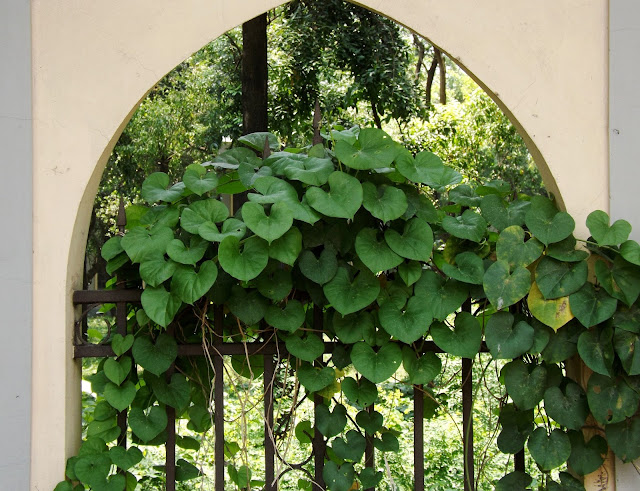Thankuni or Asiatic pennywort, Centella asiatica
Thankuni or Asiatic pennywort (Centella asiatica, family: Umbelliferae) is an aquatic perennial herb with runner or stolon whose roots and leaves grows from each of its node. Stems are slender or slightly angular, green, sometimes reddish, soft, juicy and slightly hairy when young. The prostate or creeping plant is found everywhere near the water bodies, ditches and wet soils in Bangladesh. It is one of the traditional medicinal plants of the Indian subcontinent. The plant is native to South and Southeast Asia. Nowadays it has adapted itself to other tropics.
Other names: Thulkuri, Bromhobuti, Bromhokuti, Bromhoruti, Dolmanik, Dolpata (Bang); Manduki, Mandukparni (Sans); Indian pennywort, Spadeleaf (Eng).
Leaves are in clusters, 1-4, green, blade rounded with regularly serrated edge and palmate veins, 1-3 cm long and 1.5-6 cm wide, cordate at base, petoles are up to 10 cm long.
Flower are small, white-reddish, 3-6 on umbel inflorescence with long peduncle. Propagation of the aquatic plant is caused by stolon or runner and cuttings and sometimes by seeds too. Fruits are achene, orbicular and lobed, reddish or brown when dry.
It is used as brain tonic. Leaves are used in dysentery, dyspepsia, sore and skin diseases. It is also used in preventing hair loss, excessive sweating and bad smell of body, brightening skin and increasing physical strength. It is cultivated commercially somewhere in Bangladesh. It is consumed as vegetable in the country.
Synonyms: Centella asiatica var. crista Makino, Centella boninensis, Centella glochidiata, Centella hirtella, Centella tussilaginifolia, Centella ulugurensis, Centella uniflora, Chondrocarpus asiaticus, Chondrocarpus trifloru, Glyceria asiatica, Glyceria triflora, Hydrocotyle asiatica, Hydrocotyle asiatica var. floridana, Hydrocotyle asiatica var. monantha, Hydrocotyle biflora, Hydrocotyle brasiliensis, Hydrocotyle brevipedata, Hydrocotyle dentata, Hydrocotyle ficarifolia, Hydrocotyle ficarioides, Hydrocotyle ficarioides, Hydrocotyle filicaulis, Hydrocotyle hebecarpa, Hydrocotyle inaequipes, Hydrocotyle leptostachys, Hydrocotyle lunata, Hydrocotyle lurida, Hydrocotyle nummularioides, Hydrocotyle pallida, Hydrocotyle reniformis, Hydrocotyle repanda, Hydrocotyle sarmentosa, Hydrocotyle sylvicola, Hydrocotyle thunbergiana, Hydrocotyle triflora, Hydrocotyle tussilaginifolia, Hydrocotyle ulugurensis, Hydrocotyle uniflora, Hydrocotyle wightiana, Trisanthus cochinchinensis.





Thanku!
ReplyDelete